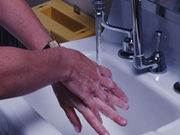Drug-resistant bacteria can colonize in drains, spread to sinks, and eventually reach patients
MONDAY, Feb. 27, 2017 (HealthDay News) — Spread of antibiotic-resistant bacteria can occur through sinks and other areas where water can pool inside hospitals, according to a study published online Feb. 24 in Applied and Environmental Microbiology.
Amy Mathers, M.D., an associate professor of medicine and pathology at the University of Virginia in Charlottesville, and colleagues created five identical sinks in a lab. The sinks were replicas of intensive care unit sinks at the University of Virginia’s Charlottesville hospital. The researchers contaminated the sinks with Escherichia coli bacteria.
After colonizing in drains, the bacteria slowly started to grow toward the sink strainers, growing 1 inch each day, the researchers found. It took one week for the bacteria to reach hospital sink strainers. Once there, the germs were soon splashed around the sink, the counters, and other nearby sinks.
The researchers are now working with the U.S. Centers for Disease Control and Prevention to pinpoint exactly how the sink bacteria reach patients. “This type of foundational research is needed to understand how these bacteria are transmitted, so that we can develop and test potential intervention strategies that can be used to prevent further spread,” Mathers explained in a journal news release.
Copyright © 2017 HealthDay. All rights reserved.








